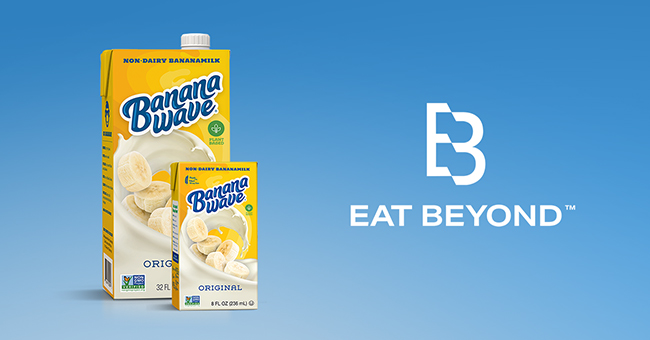Canadian investment issuer Eat Beyond Global Holdings Inc. announced today that it has signed a letter of intent to purchase Florida-based plant-milk brand Banana Wave, marking its first acquisition.
According to the terms of the deal, Eat Beyond will acquire all outstanding share capital of Mylk Brands Inc., a British Columbia-based corporation which owns Banana Wave producer Fresh Start Beverage Company. Mylk is expected to issue 14,470,588 common shares to its existing security holders at a price of $0.80 per consideration share (raising up to $11.5 million) and will issue 420,000 additional consideration shares worth $250,000 upon the automatic conversion of its outstanding convertible notes.
Speaking to BevNET today, Eat Beyond CEO Michael Aucoin said the decision to outright acquire Banana Wave reflects the firm’s more aggressive approach to investment and growth. Founded in 2019, Eat Beyond primarily invests in the plant-based food and beverage space, including CPG brands, restaurants and biotech companies. Its investments include Eat Just, The Very Good Food Company and Canadian sparkling water brand Daydream.
Aucoin joined the company this summer, bringing with him over 25 years of food and beverage experience including roles at The J.M. Smucker Company, Hershey Canada, Advantage Sales & Marketing and Agropur. While Eat Beyond has played a hands-on role in many of its investments, Aucoin said the firm now wants to take a bigger stake in its target investments, including acquisition opportunities.
“It’s fair to say our initial investments were modest out of the gate,” said Aucoin, who succeeded Patrick Morris in the CEO role. “With my arrival … it really harkens to a much more aggressive embrace of our portfolio companies and as such we’re looking to take more than what I call a token investment in the company. So we’re taking material shares.”
Founded in 2013, Banana Wave is a shelf-stable maker of banana milks headquartered in Boca Raton, Florida. The company’s products include Original, Unsweetened Original, Mango, Chocolate and Strawberry varieties of plant-milks available in 32 oz. multiserve cartons along with single serve 8 oz. versions of its Original and Chocolate flavors.
According to Aucoin, Banana Wave is primarily available in natural and specialty channel accounts, as well as ecommerce, but is now expanding into conventional grocery stores, recently launching in Piggly Wiggly.
While Banana Wave is not the only banana-focused brandin the dairy alternative segment (Mooala being among its more notable competitors), Aucoin said the brand was attractive for its differentiated approach to the growing plant-based milk category and its unique focus on banana as the hero ingredient of all its products. He noted that the fruit flavor has made the brand popular with kids and pointed to its health benefits and sustainability bonafides as signs that the brand can establish itself in mainstream retail.
“The business, quite frankly, just needed an injection of funding to really ramp up marketing and a bit of sales and sell-in distribution, and things along those lines,” he said. “So not only do we have the funds to help with that, but we’ve got the skill set to help to really kind of round that out and drive it forward.”
While Eat Beyond will look for synergies between Banana Wave and its other portfolio companies, the brand will continue to be run independently with guidance from new advisors and increased financial support. Eventually, Aucoin said, Eat Beyond aims to scale Banana Wave to a monetization event — whether by taking the brand public or exiting to a larger conglomerate.
Going forward, Eat Beyond may seek to make more acquisitions, but Aucoin said the firm will primarily focus on simply making larger and more strategic investments with higher equity return opportunities in order to attract and ultimately benefit more advisors.
“I think our original investments being modest in size you couldn’t get enough return to generate the equity gain for everyone,” he said. “So that’s where we change the strategy a bit. We’re putting more sizable chunks into fewer companies as we move forward.”
